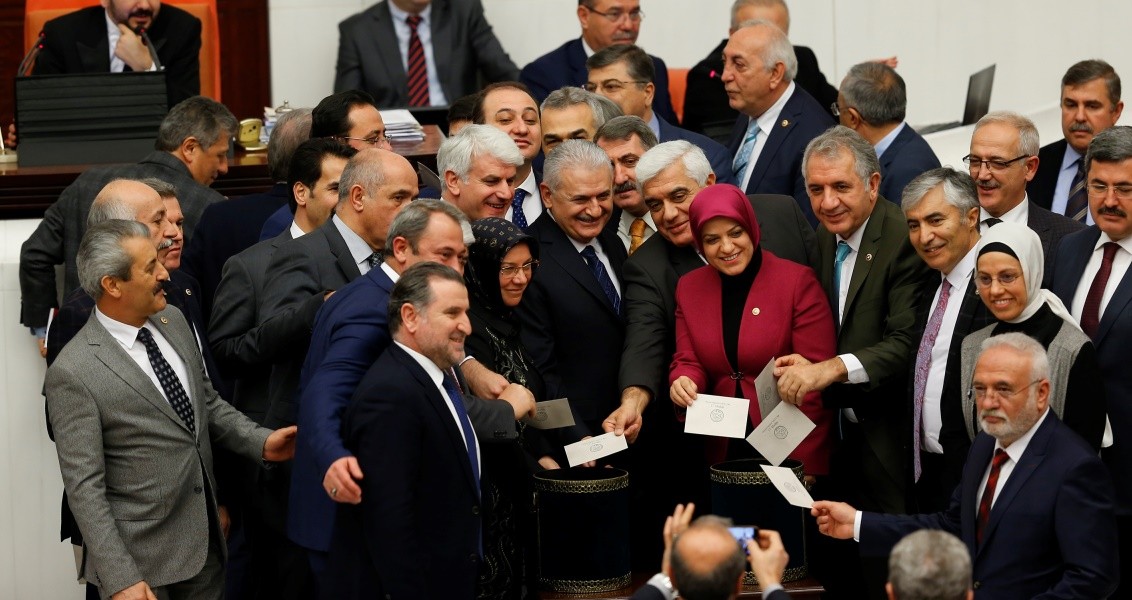
Turkey's Venture toward Presidentialism and Its Adversaries
Despite all the stress and difficulties, the systemic transformation process in Turkey must be worth to endure for a brighter future
Share
As tensions grow thanks to domestic politics, national security threats after multiple terrorist attacks and financial volatilies in the wake of speculative moves reach their zenith, these are both historic and testing days for Turkey. The transformation of the legal institutional framework of domestic politics reached a strategic conundrum with the initiative aimed at the elimination of institutional tutelage mechanisms and the foundation of a truly representative democratic system. The incumbent Justice and Development Party (AK Party) and the Nationalist Movement Party (MHP) in opposition reached a historic compromise on a constitutional package that will transform the political system from its current parliamentary system suited to fragmentation to a more robust form that stands closer to presidentialism. The intended transformation aims to advance representative governance and democratic consolidation by revising the remaining tutelary aspects of the 1982 Constitution adopted during an interim military administration determined to keep civilian political actors under the control of military-civilian bureaucracy and judicial apparatus. It also strives to galvanize stability, predictability and policy effectiveness in the domestic decision-making system by resolving the de facto schism that emerged between the popularly elected position of the prime minister and the popularly elected position of the president at the heart of the executive as a result of undemocratic interventions in the first decade of the 2000s. This systemic transition is vitally important for the future configuration of Turkish politics, state-society relations and economic governance as it promises to raise both the representative capacity and the efficiency of the state structure exponentially. As such, Turkey is bracing itself for an emerging power formulation based on swift, effective politico-bureaucratic decision making, autonomous foreign policy formulation that balances traditional Western allies with Russia and emerging powers and socio-economic development orientation based on human and technological development. Following a long and arduous process of deliberations between the AK Party and MHP officials, the critical voting process on the articles of the constitutional amendment started at the Turkish Grand National Assembly amid expected confrontations. But even before the inception of the systemically important voting process, Ankara was kept under multi-dimensional stress through various channels such as the increasing frequency of terrorist attacks by the PKK and Daesh and economic volatilities triggered by manipulative interventions in the financial markets aimed at undermining the credibility of the Turkish lira and future investment prospects in different sectors. It is not difficult to understand the motives of major global players inciting an atmosphere of instability and pessimism so as to render this crucial systemic transformation more difficult, and if possible to prevent it altogether. Frankly speaking, at a time when Turkey is successfully pursuing Operation Euphrates Shield in northern Syria despite initial objections from Washington and Brussels and global markets are going through a period of uncertainty during the takeover process by Donald Trump, it takes quite a lot of courage to initiate a radical transformation in the political system toward presidentalism, but both their friends and foes are equally aware that President Recep Tayyip Erdoğan and the social forces behind him possess huge reservoirs of courage, that is for sure.The stress test placed on Turkey by the political and economic agents of the international system increases every day that passes toward the adoption of the constitutional amendment. It is quite likely that the unpleasant mixture of political polarization stimulated by the militant style of the main opposition Republican People's Party (CHP) in Parliament, the frequent terrorist attacks by various groups and the anonymous financial manipulation will continue unabated in the short term. There is widespread agreement that the period from now to April-May when the constitutional amendment might be taken to a popular referendum for approval will be one of the most difficult periods in Turkey's Republican history. But given the potential long-term benefits that this systemic transformation might bring forward regarding Turkey's respective position in the global pecking order and the welfare of Turkish society, all the stress and difficulties for its adoption must be worth enduring.
[Daily Sabah, January 14, 2017]
Tags »
Related Articles





